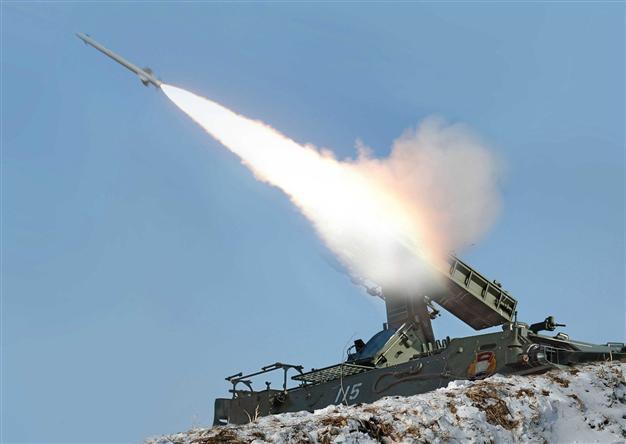North Korea tells Russia to consider evacuating Pyongyang embassy
SEOUL - Agance France-Presse

AFP Photo
North Korea has suggested to Russia that it should consider evacuating its embassy in Pyongyang due to the upsurge of tensions on the Korean peninsula, a Russian diplomat said Friday."A representative of the North Korean foreign ministry suggested that the Russian side examine the question of evacuating the employees of the Russian embassy," embassy spokesman Denis Samsonov told Russian news agencies.
He said the mission had taken note of the information and was working normally. "We are currently in the process of taking the decision," said Samsonov, adding that the current situation in Pyongyang was "absolutely peaceful".
The spokesman said he believed that a similar suggestion had also been made to other diplomatic missions in the capital.
A Russian foreign ministry source was quoted as saying by the Interfax and RIA Novosti news agencies that the security of Russian citizens was the priority in the taking of any decision.
"Unfortunately, the situation (on the Korean peninsula) is not developing in the way that we would like. For us the security of our citizens is the priority," said the source, who was not identified.
Germany summons North Korean ambassador over crisis
Germany summoned North Korea's ambassador Friday to convey Berlin's "serious concern" over the sharp spike in tensions on the Korean peninsula, a spokesman said.
"The serious concern of the German government in light of the escalation on the Korean peninsula for which North Korea is responsible was conveyed to him in no uncertain terms in the name of the foreign minister (Guido Westerwelle)," the ministry spokesman told a regular government briefing.
"It was made clear to him that the recent steps toward escalation by North Korean are in no way acceptable for the German government in word or deed." The spokesman said Germany was closely consulting with "international and European partners" on the crisis and that the subject was certain to figure prominently in a meeting of G8 foreign ministers next week in London.
He said Berlin sought a "decisive and united" response from world powers, after calling Wednesday for China to play a constructive role in the crisis.
North Korea missile movements fuel tensions
North Korea has moved a second mid-range missile to its east coast and loaded both on mobile launchers, a report said Friday, fuelling fears of an imminent firing that will further ramp up tensions.
Yonhap news agency, citing a top South Korean official, said two intermediate Musudan missiles had been transported by train earlier in the week and "loaded on vehicles equipped with launch pads."
The Defence Ministry, which on Thursday had confirmed the movement of one missile with "considerable range", declined to comment on the new report.
It was the latest incremental move by North Korea which, incensed at fresh UN sanctions and South Korea-US military drills, has issued a series of apocalyptic threats of nuclear war in recent weeks.
White House spokesman Jay Carney said Thursday the barrage of rhetoric fitted a "regrettable but familiar" pattern of North Korean behaviour.
"We're taking all the necessary precautions," Carney said, citing "prudent measures" to respond to the possible missile threat.
The Musudan has never been tested, but is believed to have a range of around 3,000 kilometres (1,860 miles), which could theoretically be pushed to 4,000 with a light payload.
That would cover any target in South Korea and Japan, and possibly even reach US military bases located on the Pacific island of Guam.
The official told Yonhap that the mobile launchers had since been hidden in special underground facilities.
"The North is apparently intent on firing the missiles without prior warning," the official said.
The Pentagon has said it will send missile-interceptor batteries to protect its bases on Guam, a US territory some 3,380 kilometres (2,100 miles) southeast of North Korea and home to 6,000 American military personnel.
Most experts think the North is not yet capable of mounting a nuclear device on a ballistic missile which could strike US bases or territory.
On Thursday the North Korean army said it had received final approval for military action, possibly involving nuclear weapons, against the threat posed by US B-52 and B-2 stealth bombers participating in joint military drills with South Korea.
"The moment of explosion is approaching fast," the army's general staff said. The blistering rhetoric has stoked international concern, with UN chief Ban Ki-moon describing the daily threats from Pyongyang as "really alarming and troubling".
"I think they have gone too far in their rhetoric and I am concerned that if by any misjudgement, by any miscalculations... this will have very serious implications," Ban said.
US Defense Secretary Chuck Hagel has said the threat levels combined with the North's military capabilities represented a "real and clear danger" to the United States and its allies South Korea and Japan.
There has been speculation that Pyongyang might schedule a firing to coincide with the birthday of the country's late founder Kim Il-Sung in mid-April.
A provocative missile test-fired into the sea over Japan is one scenario that analysts have said the North could choose to exit the crisis with a face-saving show of force.
"A flight test would make sense," said Daniel Pinkston, a North Korea expert at the International Crisis Group.
"But I'd be surprised if they used an untested missile. At this stage in the game, they don't want to be firing off something that might disintegrate after 30 seconds," Pinkston told AFP.
Tensions have soared on the Korean peninsula since December, when the North test-launched a long-range rocket. In February, it conducted its third nuclear test and drew fresh UN sanctions.
Apart from its threats of nuclear attack, the North also warned this week it would reopen its mothballed Yongbyon reactor -- its source of weapons-grade plutonium that was closed in 2007 under an aid-for-disarmament accord.
On Thursday, North Korea blocked access to its Kaesong joint industrial zone with South Korea for the second day running, and threatened to pull out its 53,000 workers in a furious reaction to the South's airing of a "military" contingency plan to protect its own workers there.
The Unification Ministry said there were still 608 South Korean citizens in Kaesong, which was shut Friday for a scheduled North Korean holiday.
















